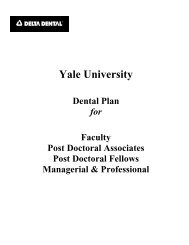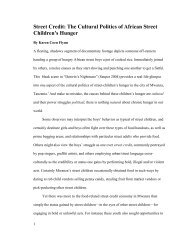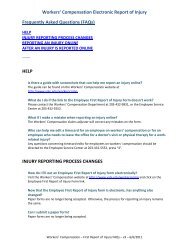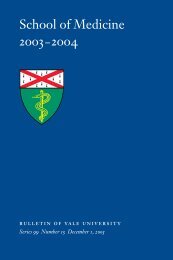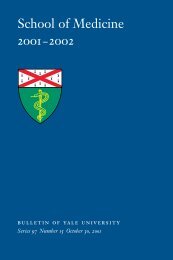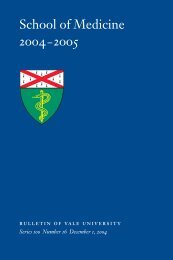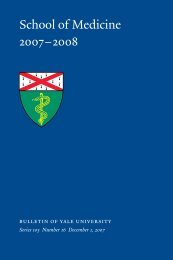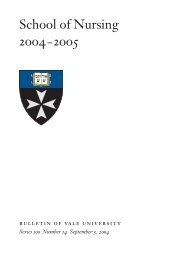110 School of Nursingassumption underlying this seminar is that mental health services should be fundamentallytheoretical and evidence-based. Discussion addresses what constitutes the bestavailable evidence to clarify decision making with regard to a variety of psychiatric disorders.Required for all students in the final year of specialization. One and one-halfhours per week. J. Pasacreta.852a/b, Advanced Psychiatric–Mental Health and Primary Care Nursing Practice.4 credit hours per term. This advanced clinical course provides comprehensive contenton concepts of illness, health promotion, and decision making and further developmentand refinement of primary care skills and clinical judgment. Nurse practitionerpreceptors assist students in their clinical development. Clinical emphasis is on assessment,diagnosis, and management of common problems in individuals with serious andpersistent mental illness. Diagnosis and management of common clinical problems areexamined within the context of the acute, ambulatory, and/or long-term settings.Required for all psychiatric nurse practitioner students in the final year of specialization.A minimum of twelve hours per week of clinical practice is required, including one hourof clinical conference. S. Talley, coordinator.853b, Specialty Didactic: The Gerontological Client/Mental Health and Aging.2 credit hours. This course provides an overview of mental health and aging, building onrelated content of psychiatric–mental health, gerontological, and medical-surgical <strong>nursing</strong>courses. Mental health assessment and intervention ranging from psychosocial anddevelopmental concerns to psychiatric disorders commonly encountered in the elderlyare discussed. Mental health strategies and psychotherapeutic interventions are examinedin relation to theories of aging, coping/adaptation, and pertinent concepts like selfesteemas they relate to this population. Teaching methods include lecture/discussion,case analysis, and role-play. Advanced practice roles in <strong>nursing</strong> care of the elderly areemphasized. Required in the final specialty year for all psychiatric <strong>nursing</strong> studentspursuing a specialization in geriatric–mental health <strong>nursing</strong>, and gerontological nursepractitioner students. Open to other students with permission of the instructor. Twohours per week. Psychiatric–Mental Health faculty.855b, Group Psychotherapy Seminar. 1 credit hour. This course examines models ofgroup psychotherapy. Emphasis is placed on the application of theory to the clinical realitiesof groups and families encountered in various inpatient and outpatient settings.Course content covers determination of treatment choices through critical thinkinginformed by assessments; cultural, ethical, and legal considerations; comparison ofpertinent models; and knowledge of basic concepts of group psychotherapy, as well asrelevant literature and research. Either 855b or 865a, Family Psychotherapy Seminar isrequired for all psychiatric–mental health <strong>nursing</strong> students in the first year of specialization.One hour per week. V. Hamrin.859a/b, Clinical Psychopharmacology. 1.5 credit hours per term. Lectures focus onprinciples of psychopharmacological treatment, mechanisms of action, and selection of
Course Listings 111pharmacological agents used to treat psychiatric disorders across the life span. Requiredfor all psychiatric–mental health <strong>nursing</strong> program students in the final year of study.Open to others with permission of the instructor. One and one-half hours per week.K. Bailey.865a, Family Psychotherapy Seminar. 1 credit hour. This course examines the majorconceptual frameworks of family therapy, including comparison of family models andbasic concepts underlying an understanding of family systems. Family developmentissues across the life span are addressed. Emphasis is placed on the application of theoryto the clinical realities of families encountered in various inpatient and outpatientsettings. Course content covers selection of appropriate family treatment modalitiesthat take into account the cultural, ethical, and legal issues that have impact onfamily life. Either 865a or 855b, Group Psychotherapy Seminar, is required for allpsychiatric–mental health <strong>nursing</strong> students. One hour per week. V. Hamrin.869c, Psychiatric Issues in the Primary Care Setting. 1 credit hour. This coursefocuses on the assessment, recognition, and treatment of psychiatric symptoms and diagnosesin nonpsychiatric settings. A biopsychosocial perspective is used to conceptualizecase formulation and differential diagnosis. Focus is on synthesis of physical, psychological,biological, and social data in order to complete a comprehensive psychiatric evaluationand treatment plan. Required along with 658c in the summer following the firstspecialty year for all students electing the psychiatric–mental health nurse practitioneroption. A total of fifteen hours of classroom seminar. S. Talley.871b, Neurobiology and Mental Illness. 1.5 credit hours. This course reviews theanatomy and function of the human brain. To illustrate the organizational plan of thehuman brain, several lectures focus on neurotransmitter pathways. The students’ understandingof brain anatomy and function is augmented by a review of neuroimaging techniques,brain development, and genetics. These findings are applied to neuropsychiatricdisorders such as Parkinson’s disease, schizophrenia, anxiety disorders, depression, bipolardisorder, Tourette syndrome, and attention-deficit hyperactivity disorder. The courseaims to build a basic understanding of the neurobiological underpinnings of mental disordersand to apply these principles to the assessment and clinical care of patients withmental disorders. The course is required for all students in the psychiatric–mentalhealth <strong>nursing</strong> specialty. Strongly recommended to be taken before or with 859a/b, ClinicalPsychopharmacology. Open to others with permission of the instructor. L. Scahill.9o1a, Methods for Nursing Research. 3 credit hours. This course provides an opportunityto examine various research designs used to investigate <strong>nursing</strong> care and caredelivery. Emphasis is placed on the interrelation among theoretical frameworks, selecteddesigns, control of variables, sample selection, research instruments, data analysis techniques,and interpretation of results. Although this course focuses primarily on quantitativemethods, in-depth illustration of qualitative methods is also provided. Three hoursper week. J. Dixon.
- Page 1 and 2:
School of Nursing2002-2003bulletin
- Page 3 and 4:
School of Nursing2002-2003bulletin
- Page 5 and 6:
RayTompkinsHouseLynw od PlaceHi lsi
- Page 7 and 8:
ContentsA Message from the Dean 7Ca
- Page 9 and 10:
A Message from the DeanCatherine Ly
- Page 11 and 12:
The President and Fellows of Yale U
- Page 13 and 14:
Faculty 11faculty* Ivy Marie Alexan
- Page 15 and 16:
Faculty 13Virginia Henderson, 1897-
- Page 17 and 18:
Faculty 15Ronald Angoff, m.d., Asso
- Page 19 and 20:
Faculty 17Stephen Malcolm Bowers, m
- Page 21 and 22:
Faculty 19Alyson Bochow Cohen, m.s.
- Page 23 and 24:
Faculty 21Kathleen Marie Demers, m.
- Page 25 and 26:
Faculty 23Carolyn Miller Federici,
- Page 27 and 28:
Faculty 25Marci Ann Garafalo, m.s.n
- Page 29 and 30:
Faculty 27Robert Wentworth Hill, m.
- Page 31 and 32:
Faculty 29Linda Kowalczuk, m.s., Cl
- Page 33 and 34:
Faculty 31Thomas J. McMahon, ph.d.,
- Page 35 and 36:
Faculty 33Moira Kathleen O’Neill,
- Page 37 and 38:
Faculty 35Monica Roosa-Ordway, m.s.
- Page 39 and 40:
Faculty 37Barney S. Spivack, m.d.,
- Page 41 and 42:
Faculty 39Elizabeth Arquin Walker,
- Page 43:
Faculty and Staff 41Elizabeth Willi
- Page 46 and 47:
44 School of NursingIn November 199
- Page 48 and 49:
CentersCenter for Excellence in Chr
- Page 51:
Academic ProgramsPaula Milone-Nuzzo
- Page 54 and 55:
52 School of Nursinggeneral enrollm
- Page 56 and 57:
54 School of NursingInternational s
- Page 58 and 59:
56 School of NursingArticulated Mas
- Page 60 and 61:
58 School of Nursingthe specialty a
- Page 62 and 63: 60 School of NursingYear OneRequire
- Page 64 and 65: 62 School of Nursingadult, family,
- Page 66 and 67: 64 School of NursingDuring the fina
- Page 68 and 69: 66 School of NursingYear TwoRequire
- Page 70 and 71: 68 School of NursingYear OneRequire
- Page 72 and 73: 70 School of NursingThe course plan
- Page 74 and 75: 72 School of Nursingand advanced pr
- Page 76 and 77: 74 School of Nursingpsychiatric-men
- Page 79 and 80: Doctor of Nursing Science Programai
- Page 81 and 82: Doctor of Nursing Science Program 7
- Page 83 and 84: Doctor of Nursing Science Program 8
- Page 85: Postdoctoral Training Program 83qua
- Page 88 and 89: 86 School of Nursing[923a, Current
- Page 90 and 91: 88 School of Nursing512c, Clinical
- Page 92 and 93: 90 School of Nursingresearch plans.
- Page 94 and 95: 92 School of Nursing564a, which foc
- Page 96 and 97: 94 School of Nursingper week for ac
- Page 98 and 99: 96 School of Nursingpractitioner, f
- Page 100 and 101: 98 School of Nursingdevelopment are
- Page 102 and 103: 100 School of Nursing721a/b, Schola
- Page 104 and 105: 102 School of Nursingmanagement of
- Page 106 and 107: 104 School of Nursing769a, Advanced
- Page 108 and 109: 106 School of Nursing8o3a/b, Oncolo
- Page 110 and 111: 108 School of Nursing827a, Pathophy
- Page 114 and 115: 112 School of Nursing9o3a, Measurem
- Page 116 and 117: 114 School of Nursing[921b, Seminar
- Page 119 and 120: General Informationtuition, special
- Page 121 and 122: General Information 1192. If the ch
- Page 123 and 124: General Information 121As an altern
- Page 125 and 126: General Information 123include Ethe
- Page 127 and 128: General Information 125In addition,
- Page 129 and 130: General Information 127Eligibility
- Page 131 and 132: General Information 129The School o
- Page 133: General Information 131OISS by subs
- Page 136 and 137: 134 School of NursingThe Connecticu
- Page 138 and 139: 136 School of Nursingmedical and pe
- Page 140 and 141: 138 School of Nursingcare, and home
- Page 142 and 143: 140 School of NursingConnecticut Ch
- Page 144 and 145: 142 School of NursingInternal Medic
- Page 146 and 147: 144 School of NursingRehabilitation
- Page 149 and 150: University ResourceslibrariesThe ma
- Page 151 and 152: University Resources 149may use the
- Page 153 and 154: Candidates for Degree of Masterof S
- Page 155 and 156: Master’s Degree Candidates 153Sar
- Page 157 and 158: Distribution of GraduatesAlumni rec
- Page 159 and 160: The Work of Yale UniversityThe work
- Page 161 and 162: Index of CoursesAdult Development:
- Page 163 and 164:
Index of Courses 161Oncology Sympto
- Page 165 and 166:
The University is committed to basi




